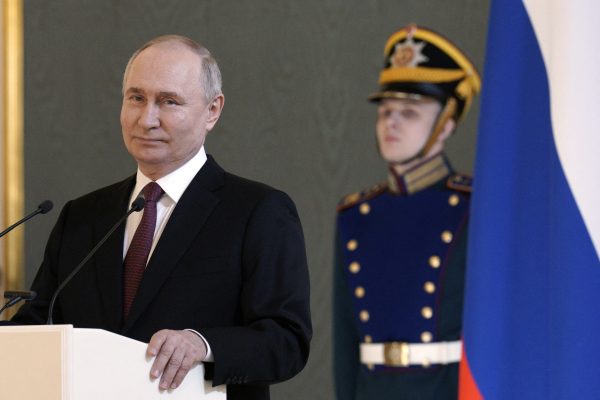The far-right candidate facing off in a close race against President Emmanuel Macron on April 24 wants to clamp down on digital platforms and even create a “free, public social network” if they fail to cooperate with her.
“France and the countries of Europe do not benefit from the sectors’ economic growth as the US and China, crush them,” she complains. Her program denounces digitalization, indeed almost all progress, in strident terms. Tech “deprives us of personal autonomy” by “taking over all the activities that we no longer do ourselves,” it reads.
Incumbent Macron is no tech softie. He led the charge for European tech sovereignty and backed strong EU regulation of the sector. On the election trail this week, he called for “the dismantling” of US tech platforms, comparing their present monopolies to Standard Oil in the 19th century. But Macron has also succeeded in fashioning himself as a tech fan – even wearing a Steve Jobs-style black turtleneck this past February to celebrate the creation of 25 French unicorns, start-ups with a market value above €1 billion each. Under his watch, tech investments in France have soared.
Le Pen shares the right-wing’s fear that Silicon Valley is intent on censoring conservative voices. Digital platforms, governed “by their own rules,” should no longer be able to impose “censorship” on people, she says. Platforms should allow only judges to decide on the removal or non-removal of content. If social media giants Facebook, Instagram, and Twitter fail to comply with her demands, Le Pen says she will build a free, public social network.
The far right’s tech sovereignty plan goes beyond content moderation. She wants to counter American dominance by subsidizing French or European champions, offering them both “targeted aid for digital companies,” and by giving priority to French or European suppliers.” Under her watch, only French suppliers will be allowed to bid for public procurement in military and security.
“This preference is in line with existing national and European legislation, but has so far remained unimplemented,” she said. If elected, she wants “strict control “over foreign takeovers of leading French companies.
Data protectionism is another Le Pen priority. She wants to make it compulsory for French public data to be hosted by French or European cloud services. Targeted advertising must be limited. European service providers must also benefit from a “right to process data by default” while foreign operators will have to provide additional guarantees, she added.
To her, crypto is a dirty word and crypto-assets should be heavily regulated.
Gig workers for Uber and other platforms must become employees.
Some of these ideas are not far from the French and European mainstream – and presented as a response to US protectionism. During the French presidential campaign, most candidates endorsed a “Buy European Act” designed to fight on equal terms against the American or Chinese giants. Drawing inspiration from the “Buy American Act”, the “Buy European Act” could allow the EU to bypass free trade rules in order to reserve European companies a share of the public procurement market. We must “strengthen our French or European companies,” said the Green candidate, Yannick Jadot. “All our trading partners are doing it.”
On Le Pen’s right, candidate Éric Zemmour called for the creation of a European public procurement mechanism to set aside a specific share for national companies, particularly in cloud and cybersecurity. On the left, Jean-Luc Mélechon warned that a “Buy European Act” must ensure that the European companies put forward are not clients of US giants, without which “digital sovereignty would only be a chimera.”
During the campaign, Macron came under criticism for favoring US tech, in particular, his decision to allow Microsoft to host the country’s health data. In response, the incumbent toned down his free-market ideas. Macron’s 2022 manifesto aims to “revise the State’s purchasing policy: the main objective will be to buy local, rather than always buying cheaper, in order to develop innovation and the French industries.”
Mathieu Pollet is Euractiv’s France correspondent.
This article was adapted with the author’s approval from EURACTIV. EURACTIV is an independent pan-European media network specialized in EU affairs including government, business, and civil society
Bandwidth is CEPA’s online journal dedicated to advancing transatlantic cooperation on tech policy. All opinions are those of the author and do not necessarily represent the position or views of the institutions they represent or the Center for European Policy Analysis.





